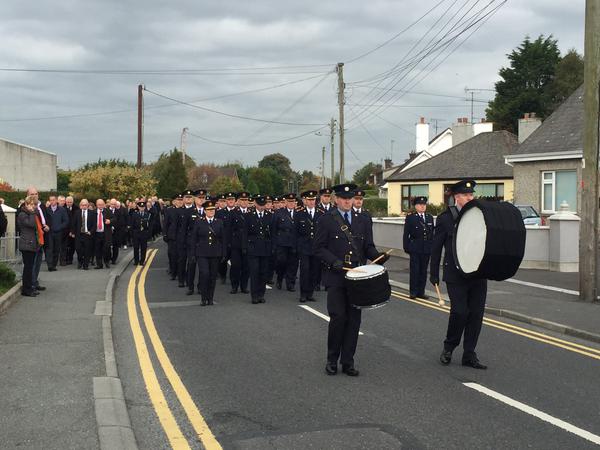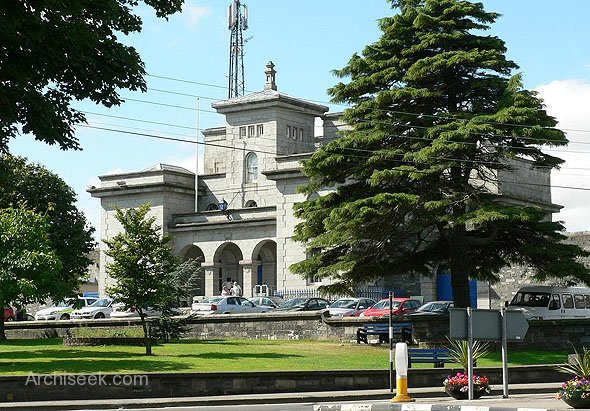
4,000 Gardaí line the streets of Blackrock as part of the funeral cortege. Picture: Niall Carroll
Garda Tony Golden was described as “one of life’s gentlemen” at his State funeral in Oliver Plunkett Church today.
Thousands gathered in the seaside village, including an estimate 4,000 Garda colleagues, to pay their respects to the father of three, who was the 88th member of the force to be killed in the line of duty when he was shot dead in Omeath in Sunday.
The church was reserved for family members and official dignatories, including Taoiseach Enda Kenny, President Michael D Higgins and his wife Sabina, Garda Commissioner Noirin O’Sullivan, Justice Minister Frances Fitzgerald and the chief constable of the PSNI George Hamilton.

Chief celebrant Fr Padraig Keenan, parish priest of Blackrock and Haggardstown, told mourners it was difficult to imagine the grief caused by Garda Golden’s death.
“One cannot imagine the pain and hurt that is experienced by the loss of those who loved Garda Tony,” Fr Keenan said.
“Tony quietly let his light shine in so many ways through his life in a very humble way. Amidst our sadness may we be thankful for the charisma of his beautiful but too short life.”
A Ballina Stephanites GAA club jersey and hurley and family photographs were brought to the altar in memory of Garda Golden. A garda colleague, Kevin Cleary, presented some of Garda Golden’s favourite hobbies and snacks – a remote control, a can of Coke, crisps, ‘Drifter’ bar of chocolate and Hunky Dorys.
Father Keenan said news of Garda Golden’s death had shattered Co Louth and beyond on Sunday evening.
“In the stillness of a beautiful Sunday evening, last Sunday, we shared as a nation in the joy of a momentous sporting moment on the playing field of the Millennium Stadium in Cardiff,” he said.
“That stillness was shattered in the picturesque village of Omeath as it became the centre of national and international coverage in light of the tragic events that unfolded.
“The magnitude of what took place brings to mind all those who have been affected in so many ways.
“Tragically it resulted in the cold blooded murder of Garda Tony Golden in the line of duty. Murder is evil, murder has no place in our society. Murder must stop. All forms of violence must stop.
“We remember in our thoughts and prayers the young woman Siobhan who is seriously injured.
“Garda Tony is the 88th member of An Garda Síochána who has died protecting our country, our society and our community.
 “It is 88 members too many.
“It is 88 members too many.
“He like all the others is mourned by the entire nation.
“His murder brings to mind once again all the families and communities that have been affected on our island.”
Mourners heard how North Louth has been affected by the Troubles in years gone by and how Garda Golden’s death was a harsh reminder of the death of Detective Garda Adrian Donohoe at Lordship Credit Union in Bellurgan in January 2013.
“Too many hearts have been broken, and lives shattered,” Fr Keenan told the church.
“I say on this day, from the depths of my heart – and I am sure I speak for all people of goodwill – when I say that there is no place for violence in our society, violence is wrong, always wrong.
“As a husband, father, son, brother family member and friend, each and every one of his family circle expressed such love and pride for Tony.
“Tony was one of life’s gentlemen. As Patrick his brother said to me, “A big gentle giant”, a lovely man.
“He had a charisma that was calm, gentle and polite, as reflected in our second reading.
“Tony showed us a way to love that is better than anything else in life. Tony with Nicola believed in life, a life that gave them hope in the spirit of love.
“Tony made his time on this earth beautiful in so many ways, and in one’s brokenness, they will be the memories to be always treasured and cherished forever.”
He assured the congregation that Tony’s spirit would be with his three children as they grow up.
Gardaí had earlier escored Tony’s remains from his house in Sandygrove to the church, with thousands of his colleagues lining the way to the church.

Large screens were erected in Blackrock so mourners could watch the funeral proceedings, with RTÉ providing a live audio broadcast on their website.
Tony is survived by his wife Nicola (nee O’Sullivan), children Lucy, Alex and Andrew, parents Breege and David, brothers David, Kenneth, Patrick and Sean, sister Mary, parents-in-law Tony and Iris, sisters-in-law Majella, Laura, Aisling and Tara, brother-in-law Jonathan, aunts, uncles, cousins, nephews, nieces, relatives, friends and colleagues in An Garda Síochána.
Earlier, former Justice Minister and local TD Dermot Ahern described Blackrock as “shattered” by the tragedy.
“I’m a member of this community, born and bred, and we’re absolutely shattered,” he said.
“Tony’s wife is a local here; I know her and I know her parents very well. I knew Tony. And the whole place is just completely shattered with what’s happened.”
Burial will follow the funeral in Heynestown Cemetery.









